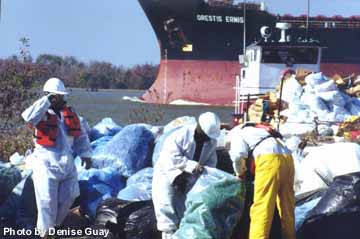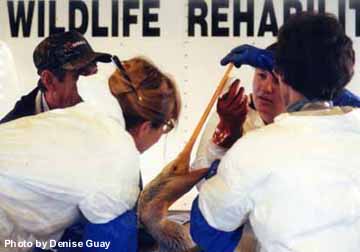Oil Spill Doesn't Stop Orange Fest Good Times
and Denise Guay FORT JACKSON, La. -- The faint odor of crude oil rising from the Mississippi River didn't stop the good times from rolling this weekend at the Plaqemines Parish Fair and Orange Festival. Everyone seemed to appreciate the luck and timing surrounding one of the largest oil spills ever in these parts. Dale "Bear" Benoit, a local newspaper publisher and this year's fair manager, said he was concerned Wednesday and Thursday that the "strong odor in the air would be disruptive." "Fortunately," he said, "the spill happened far enough in advance." The cleanup-crew cooperated with fair organizers and moved the oil far enough away so that the smell was cleared out for the most part by Saturday in time for the festival. Just on the other side of the grass-covered levee from the old fort, contract workers in protective suits sucked oil from the river's surface into two pumping trucks, and stuffed oil-soaked polypropylene into trash bags. Downriver at Venice, wildlife officials chased down, trapped and cleaned up oil-covered animals, mostly cormorants and pelicans. The Coast Guard-led cleanup effort continued through the weekend, a battle against what was left of the half-million gallons of oil that spilled into the river Tuesday night from an 890-foot, single-hulled tanker. The Westchester lost power when an engine exploded, causing it to run aground Tuesday night near Port Sulphur, upriver from important oyster grounds near Empire, and Ft. Jackson, 6 miles south of Buras, the site of the fair. Americans on these battlements first fought the French and British in the War of 1812. It was held by the Confederacy for much of the Civil War. During World War II, spotters watched for German U-boats trying to sneak into the lower Mississippi River. Then the Fort was abandoned by the federal government, and inundated by the surrounding swamp. Parish officials had it dug up and restored in 1961, and began using it as a fair grounds and setting to celebrate the annual citrus harvest. While Americans associated oranges with Florida and California, oranges are the largest cash crop and major industry in the Southeast corner of Louisiana, along with fishing and the oil and gas industry. While everyone admitted there is no such thing as a good oil spill, a spokesperson for the cleanup said the timing and conditions couldn't have been better. "You couldn't have asked for better weather for a cleanup," Ann Schiffman said. Temperatures in the 60s during the day was perfect for workers, not too hot, not too cold. Cooler temperatures at night caused the oil floating on the river's surface to coagulate, making it easy to soak up. The east bank across from the spill is an important waterfowl migration destination, and it is a critical time of year, when 300,000 geese and ducks settle in every fall in the bayous and marshes of eastern Plaquemines Parish. "It could have been really bad if it had been on the other side," Schiffman said.
The requirement for preparation seemed to work. "You never want to have a spill, but we've been really lucky on this one," Benoit said. "The wind kept the oil on the west bank, and the Coast Guard acted really fast and good at cleaning it up." Wildlife officials agreed.
Some species seem to know how to avoid the oily areas, Miller said, like the gulls and terns. The diving birds get into it the worst. But as long as the birds are rescued and cleaned up so they can breath, swallow and protect themselves against the weather, they should be able to live and breed successfully. "These birds are coming through strong," she said. "We don't believe there will be long-term effects. We lucked out." Meanwhile back at the fair, Miss Hollie Reneé D'Amico was crowned Orange Queen, escorted by Plaquemines Parish Sheriff I.F. "Jiff" Hingle, the king. Locals fought to see who was the fastest at skinning catfish, oyster shucking and shrimp head popping and peeling. About 300 people bundled up against the cold wind from the east and stuffed on gumbo, crab pies, and fried green tomatoes in shrimp and mushroom sauce, with sliced satsumas for desert. The band played cajun music, and the people danced, the spilled oil a fading memory. Glynn Wilson and Denise Guay are free-lance journalists based in New Orleans.
Copyright © The Southerner 2000.  |


